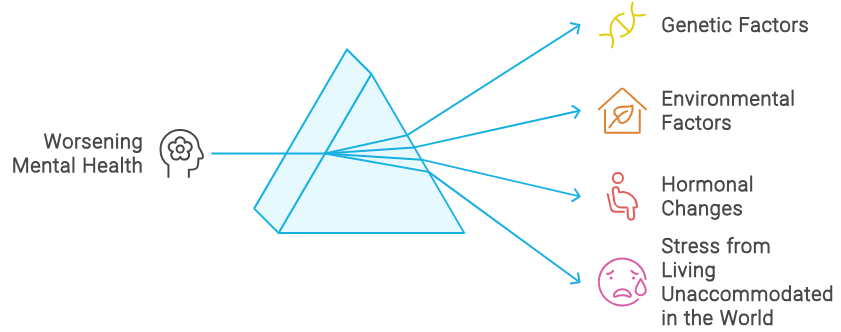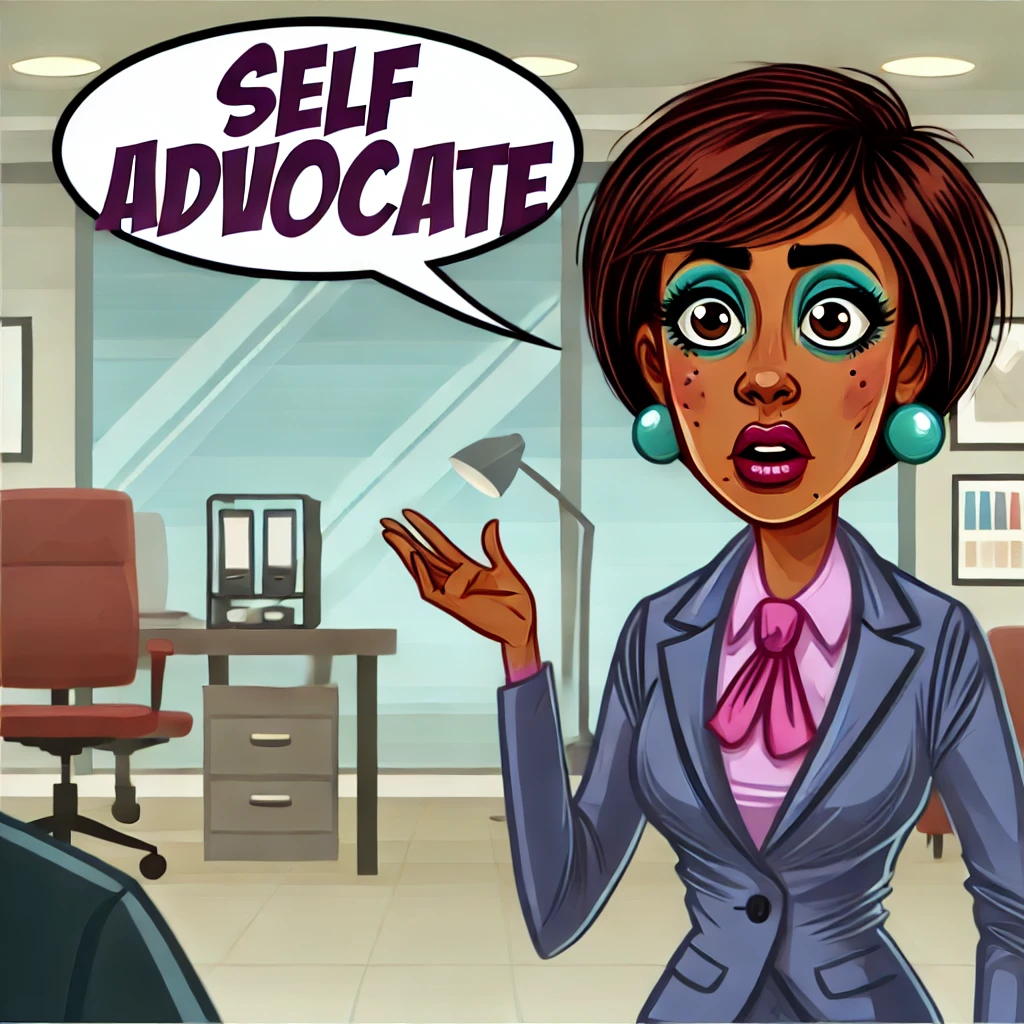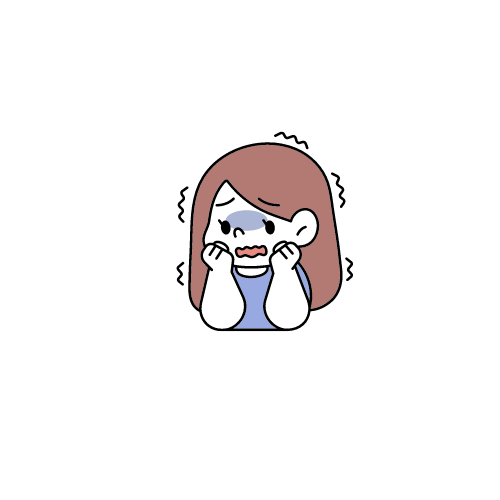Understanding the Impact of ADHD on Women’s Mental Health
Attention Deficit Hyperactivity Disorder (ADHD) significantly impacts women's mental health, often in ways that could be avoided with proper support from an early age. Unfortunately, many women do not receive the help they need as girls, which leads to long-term consequences that affect both their mental and physical health.
Understanding ADHD and Mental Health in Women
ADHD is a neurodevelopmental difference, not a mental health condition. However, instead of receiving support for this difference, individuals with ADHD are often expected to conform to "normal" standards. For women, this expectation is compounded by societal pressures to juggle multiple roles and responsibilities without adequate support, further straining their mental health.
As a result, many women with ADHD experience significant stress and are more likely to develop mental health conditions and physical illnesses.
Impact of ADHD on Mental Health
The effort of managing life while hiding ADHD symptoms as a women can be exhausting. From a young age, women with ADHD often struggle to meet societal expectations, leading to feelings of self-doubt and shame. To fit in and be accepted, many engage in "masking"—hiding their perceived flaws or differences. This can involve pretending to understand things they don’t, concealing their true feelings, or focusing on pleasing others to avoid standing out. These behaviors, while protective, can lead to severe anxiety, chronic stress, depression, exhaustion, and even physical illness over time.
What make Mental Health Worse in ADHD Women?
Mental health conditions in women and adults with ADHD often arise from a combination of genetic, environmental, and psychological factors:
- Genetic Factors: Many mental health disorders, such as ADHD, depression, and anxiety, tend to run in families. While specific genes linked to brain function can increase susceptibility, genetics alone do not determine mental health outcomes.
- Environmental Factors: Childhood trauma, abuse, neglect, or prolonged stress from socioeconomic challenges or stress in families can disrupt brain development and emotional regulation, increasing the risk of mental health issues.
- Hormonal Changes: Hormonal fluctuations throughout life—during the menstrual cycle, after childbirth, and during menopause—can worsen mental health symptoms in women with ADHD.
-
- Hormone Related Mental Health Issues: ADHD women more likely to experience conditions like postpartum depression and anxiety, generalized anxiety disorder (GAD), premenstrual dysphoric disorder (PMDD), and mood swings during menopause. Studies show these women may experience a 2-3 times increase in mood changes during hormonal shifts.

Women with ADHD are often underrepresented in medical research due to biases against women, which has led to a significant gap in understanding their specific needs. This gap affects our ability to provide practical help and support for women with ADHD, particularly in understanding how hormonal changes interact with ADHD symptoms and impact overall mental health. More research is needed to explore these interactions to develop better treatments and comprehensive support strategies that address the unique experiences of neurodivergent women.
Late Diagnosis of ADHD and Mental Health
Even though ADHD typically begins in childhood, many women are not diagnosed until their 40s, 50s, or even 60s. A proper diagnosis is crucial as it opens the door to specialized treatment plans, potential medication management, coping strategies, and targeted therapy to mitigate ADHD’s impact.
The Impact of Late Diagnosis on Women's Mental Health
A late adhd diagnosis can profoundly affect women's mental health, often leading to a range of additional challenges. Girls don't present with signs of impulsivity or "bad behavior" that's visible as often as boys do. Instead girls show signs of inattention or lack of focus that they cover up as a child. These signs typically fly under the radar and go unnoticed by parents and teachers.
Without early recognition and information about their neurodivergence and support for executive funcitoning, women with ADHD may underachieve in school or experience stress that no one knows about.
In the workplace, undiagnosed ADHD can hinder career progression, leading to missed opportunities and confusion about why they are note succeeding.
Socially, communication differences can make interactions exhausting and confusing and lead to strained relationships and isolation.
Many women cope by masking their symptoms to fit in, which is linked to mental health issues such as depression, anxiety, and even suicide.
How ADHD and Mental Health Issues are Treated in ADHD Women
ADHD is typically treated using a combination of behavioral therapies, medication, and lifestyle changes. Cognitive Behavioral Therapy (CBT) is often employed to help individuals manage symptoms by developing coping strategies, improving organizational skills, and addressing negative thought patterns. Stress management techniques, such as mindfulness and relaxation exercises, are also recommended to help reduce anxiety and improve focus.
When treating ADHD alongside other mental health issues like anxiety and depression, a more comprehensive approach is taken. This often includes a combination of stimulant or non-stimulant medications to address ADHD symptoms and selective serotonin reuptake inhibitors (SSRIs) or other antidepressants to manage anxiety or depression. The treatment protocol involves close monitoring by healthcare professionals to adjust medications and therapeutic strategies as needed, ensuring both conditions are effectively managed without exacerbating symptoms of the other.
Many individuals with ADHD, particularly women, report dissatisfaction with their psychiatrists and therapy experiences. They often feel that traditional therapy modalities like Cognitive Behavioral Therapy (CBT) can be invalidating, as these approaches may not fully consider the unique neurodevelopmental aspects of ADHD, leading to feelings of being misunderstood or gaslit. Additionally, they express concerns that some therapists lack a deep understanding of ADHD, focusing too heavily on symptom control rather than acknowledging the broader context of neurodivergence and the lived experiences of ADHD individuals.
What Therapy Should Look Like for ADHD women and Mental Health Issues
Therapy should be neurodivergent-affirming, sensitive to the effects of hormones on mental health and stress, and aware of the impact of masking and the challenges associated with late diagnosis.
To be effective, therapy should also assess for co-occurring conditions and provide access to services that support these conditions. Unfortunately, many treatment plans today lack these essential components. Mental health treatment for ADHD in the U.S. often focuses on correcting behaviors rather than recognizing ADHD as a neurodevelopmental condition that requires a supportive and affirming approach.
Psychiatrists and mental health professionals should help ADHD and other neurodivergent individuals live their best lives by actively screening for co-occurring mental health and medical conditions. Many professionals report they lack the information about ADHD treatment they need to provide appropriate care.
Comorbid or Co-occurring Mental Health Conditions and ADHD in Women
Women with ADHD often experience a range of co-occurring conditions, including:
- Mood Disorders: Major Depression, Dysthymia, Bipolar Disorder, Premenstrual Dysphoric Disorder (PMDD), Postpartum Depression (PPD)
- Trauma-Related Disorders: Post-Traumatic Stress Disorder (PTSD), Complex PTSD
- Sleep Disorders: Insomnia, Sleep Apnea, Restless Legs Syndrome, Delayed Sleep Phase Syndrome
- Chronic Pain Conditions: Fibromyalgia, Chronic Fatigue Syndrome, Migraines
- Hormonal and Reproductive Health Issues: Polycystic Ovary Syndrome (PCOS), Menstrual Irregularities, Menopausal Symptoms, Endometriosis
- Neurodevelopmental and Learning Disorders: Autism ), Dyslexia, Dyscalculia, Dyspraxia (Developmental Coordination Disorder - DCD)
- Eating Disorders: Binge Eating Disorder, Bulimia Nervosa, Anorexia Nervosa
- Substance Use Disorders: Alcohol Use Disorder, Nicotine Dependence, Other Substance Use Disorders
- Personality Disorders: Borderline Personality Disorder (BPD), Avoidant Personality Disorder
- Gastrointestinal Issues: Irritable Bowel Syndrome (IBS), Gastroesophageal Reflux Disease (GERD)
- Autoimmune and Inflammatory Conditions: Lupus, Rheumatoid Arthritis, Multiple Sclerosis (MS)
- Metabolic and Endocrine Disorders: Type 2 Diabetes, Thyroid Disorders, Metabolic Syndrome
- Cardiovascular Issues: Hypertension (High Blood Pressure), Dyslipidemia (Abnormal Cholesterol Levels)
- Connective Tissue Disorders: Ehlers-Danlos Syndrome (EDS)
- Sensory Processing Issues: Sensory Processing Disorder, Auditory Processing Disorder
- Executive Functioning Challenges: Executive functioning issues vary in their presentation but should be assessed, supported, and addressed. A coach can sometimes provide coping strategies.
Treatment Approaches for ADHD and Mental Health
ADHD is often treated with behavioral therapies, medication, and lifestyle changes. CBT and stress management techniques like mindfulness are commonly used. Still, they can feel invalidating for many ADHD women because they do not always consider the unique experiences of neurodivergent individuals, such as the impact of masking, hormonal fluctuations, and late diagnosis.
Medication Options for Managing ADHD and Mental Health
Treatment for ADHD with co-occurring anxiety or depression often involves a mix of stimulant or non-stimulant medications and antidepressants. However, many ADHD women report problems such as inadequate symptom relief, lack of preparedness for side effects, and a failure by healthcare providers to understand how ADHD interacts with other mental health conditions. They need a more holistic approach that addresses both ADHD and co-occurring conditions in an integrated way.
What Therapy Should Look Like for ADHD Women
Clients with ADHD, particularly women, often feel that traditional therapies focus too much on behavior correction rather than understanding ADHD as a neurodevelopmental condition. They report that their needs are frequently unmet due to a lack of awareness of the emotional toll of masking, the effects of hormonal changes, and the stress of a late diagnosis. Therapy should be neurodivergent-affirming, provide education on ADHD, offer emotional support, and include practical strategies for daily life. It should also involve comprehensive screening for co-occurring conditions and create a collaborative treatment plan that acknowledges and respects each individual’s unique experiences and strengths.
Some resources for ADHD and Mental Health
Check out the Duke Center for Women and Girls
Founded in 2021, the Duke Center for Girls & Women with ADHD is one of the nation’s only programs explicitly dedicated to advancing knowledge about Attention-Deficit/Hyperactivity Disorder (ADHD) in girls and women. The center is part of the Duke ADHD Program, founded 30 years ago.
References on this Topic
Dorani, F., Bijlenga, D., Beekman, A. T. F., van Someren, E. J. W., & Kooij, J. J. S. (2021). Prevalence of hormone-related mood disorder symptoms in women with ADHD. Journal of Psychiatric Research, 133, 10-15. https://doi.org/10.1016/j.jpsychires.2020.12.001
Schein, J., Cloutier, M., Gauthier-Loiselle, M., Catillon, M., Meng, Y., Libchaber, B., … Childress, A. (2024). Treatment Preferences of Adult Patients with Attention-Deficit/Hyperactivity Disorder – A Discrete Choice Experiment. Patient Preference and Adherence, 18, 1651–1664. https://doi.org/10.2147/PPA.S467724







